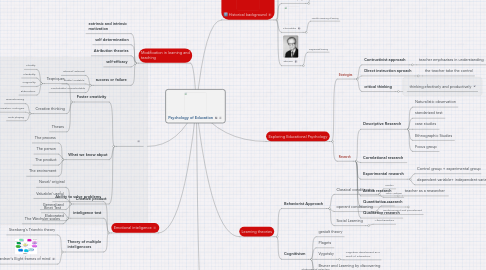
1. Creativity
1.1. Foster creativity
1.1.1. Teqniques
1.1.1.1. Fluidity
1.1.1.2. Flexibility
1.1.1.3. Originality
1.1.1.4. Elaboration
1.1.2. Creative thinking
1.1.2.1. Brainstorming
1.1.2.2. Creative Analogies
1.1.2.3. Role playing
1.1.3. Theses
1.2. What we know abput
1.2.1. The process
1.2.2. The person
1.2.3. The product
1.2.4. The enviroment
1.3. Creative product
1.3.1. Novel/ original
1.3.2. Valuable/ useful
1.3.3. Generalized
1.3.4. Elaborated
2. Emotional inteligence
2.1. Ability to solve problems
2.2. inteligence test
2.2.1. Binet Test
2.2.2. The Wechsler scales
2.3. Theory of multiple inteligencces
2.3.1. Stenberg's Triarchic theory
2.3.2. Gardner's Eight frames of mind
3. Modification in learning and teaching
3.1. extrinsic and intrinsic motivation
3.2. self determination
3.3. Atribution theories
3.4. self-efficacy
3.5. success or failure
3.5.1. internal/ external
3.5.2. Stable/ unstable
3.5.3. Controlable/ uncontrolable
4. Historical background
4.1. Williams James
4.1.1. Observing teaching: "Talk to teachers"
4.2. John dewey
4.2.1. Learning by doing
4.3. Thorndike
4.3.1. Scientific reasoning of learning
4.4. Skinner
4.4.1. Programmed learning
5. Exploring Educational Psychology
5.1. Strategies
5.1.1. Contructivist approach
5.1.1.1. teacher emphazises in understanding
5.1.2. Direct instruction aproach
5.1.2.1. the teacher take the control
5.1.3. critical thinking
5.1.3.1. thinking efectively and productively
5.2. Research
5.2.1. Descriptive Research
5.2.1.1. Naturalistic observation
5.2.1.2. standarized test
5.2.1.3. case studies
5.2.1.4. Ethnographic Studies
5.2.1.5. Focus group
5.2.2. Correlational research
5.2.3. Experimental research
5.2.3.1. Control group + experimental group
5.2.3.2. dependent variable+ independent variable
5.2.4. Action research
5.2.4.1. teacher as a researcher
5.2.5. Quantitative research
5.2.5.1. Close-ended questions
5.2.6. Qualitative research
6. Learning theories
6.1. Behaviorist Approach
6.1.1. Classical conditioning
6.1.1.1. Pavlov
6.1.1.2. John Watson
6.1.2. operant conditioning
6.1.2.1. Skinner
6.1.2.2. reinforcement and punishment
6.1.3. Social Learning
6.1.3.1. Albert Bandura
6.2. Cognitivism
6.2.1. gestalt theory
6.2.2. PIagets
6.2.3. Vygotsky
6.2.3.1. Cognitive develoment as a result of interection
6.2.4. Bruner and Learning by discovering
6.2.5. Ausubel: The Theory of meaningful learning
7. Learning Strategies
7.1. cognitive/ processing strategies
7.1.1. Strategies of selection
7.1.2. Rehearsal strtegies
7.1.3. Strategies of organization
7.1.4. Strategies of elaboration
7.2. Support strategies
7.2.1. Strategies of personification
7.3. Metacognitive strategies
7.3.1. Assesment of learning strategies
7.3.2. programs aims to foster inteligence
